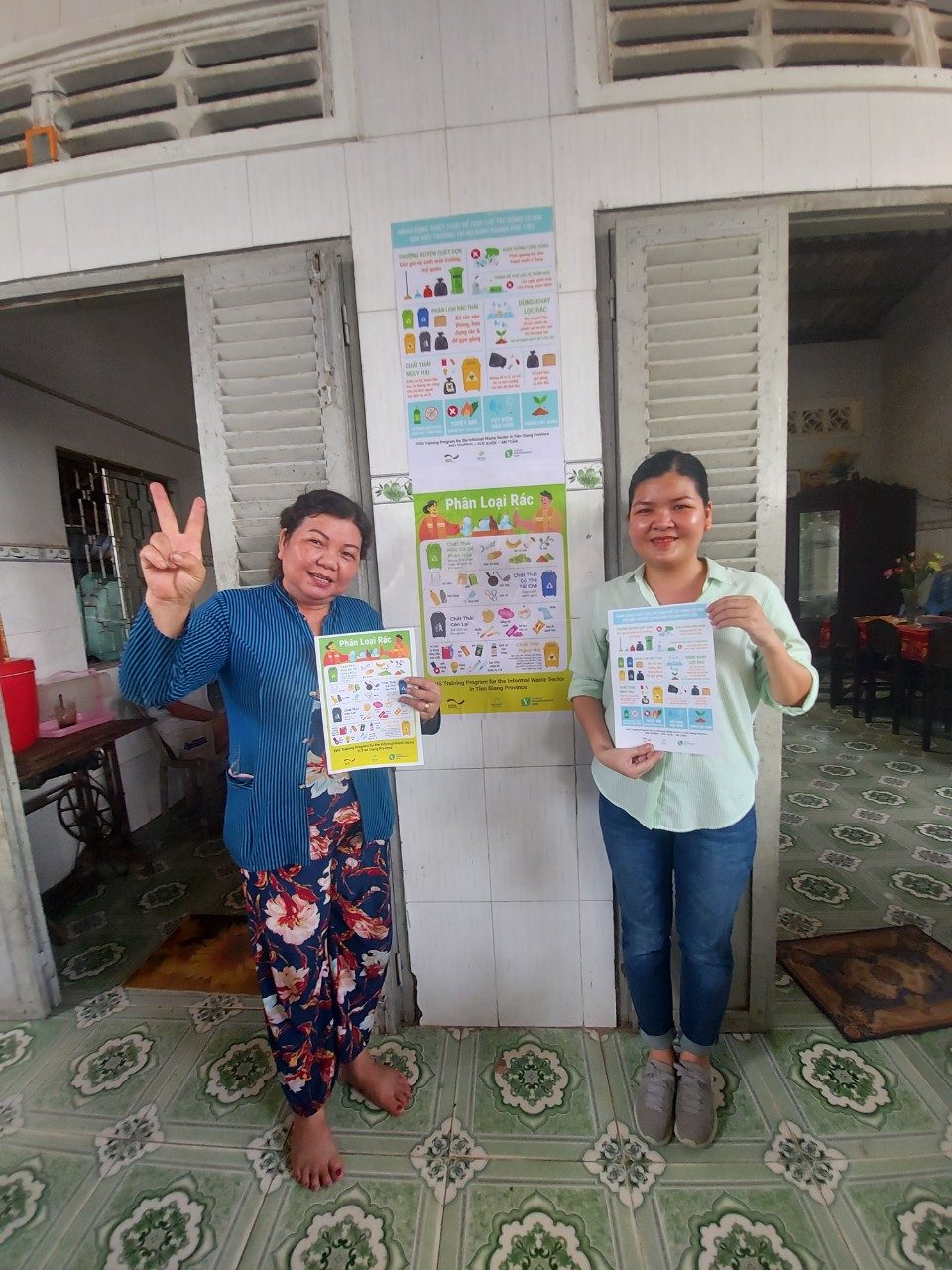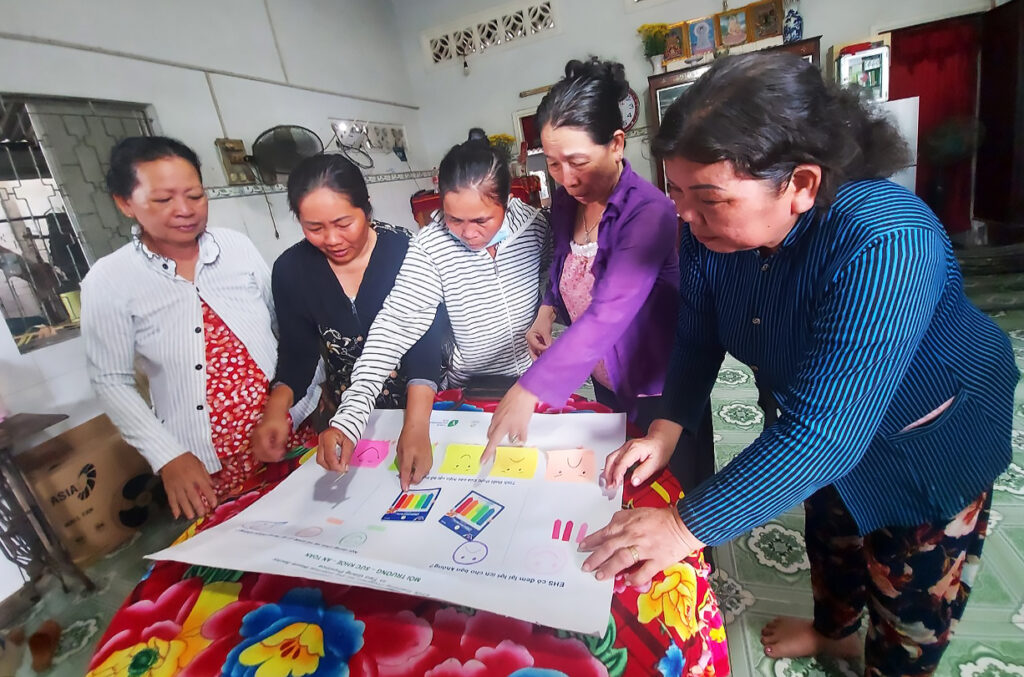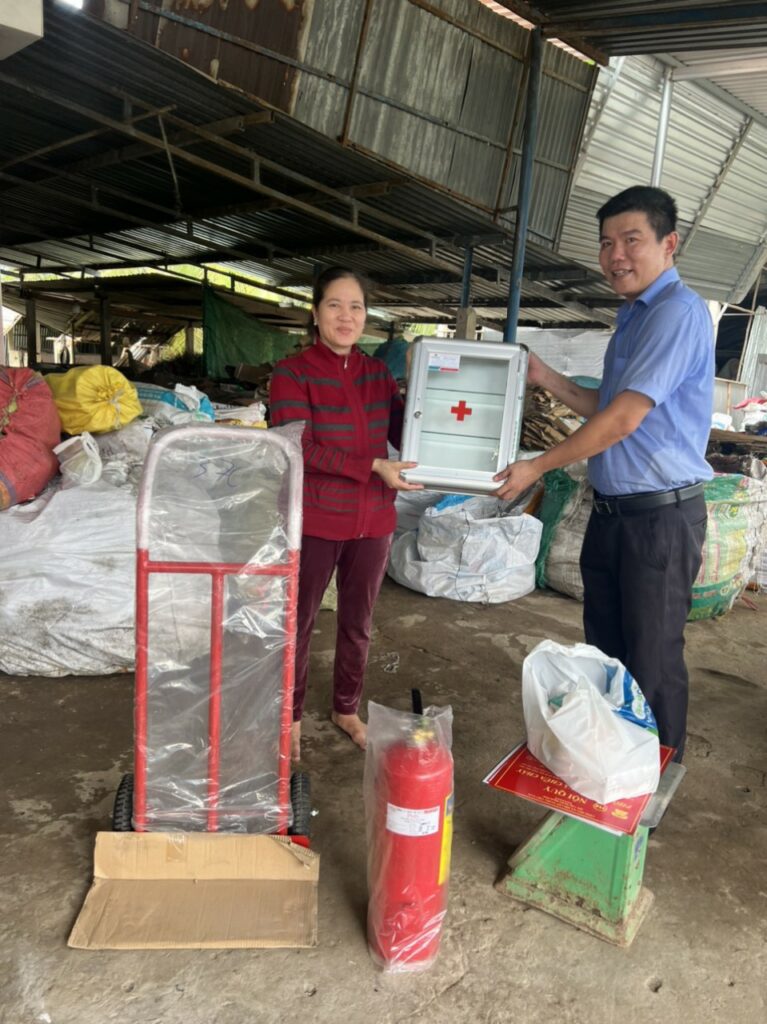Share this article
Training for the Informal Waste Sector

Yunus Environment Hub develops and implements training programs for the informal waste sector to improve working and living conditions and upskill on digital tools and financial knowledge. Programs impact individual waste pickers, scrap shops, and aggregators with a goal to contribute to a Just Transition along the waste value chain.
YEH Training Programs for the informal waste sector include:
- Environment, Health & Safety (EHS)
- Digital Training for EPR scheme integration.
- Financial Training
EHS Training
Yunus Environment Hub EHS training programs help strengthen the local informal waste sector through capacity development. We work directly with scrap shop workers, waste collectors and other key stakeholders to deliver customised training adapted to local needs.
By raising awareness and providing access to proper safety equipment, we aim to help improve working conditions and minimize negative environmental impacts from the informal waste sector.
Our overarching objective of these trainings is to support the mid- and long-term behavioural change of operations and processes in the waste management sector to ensure safe and decent work aligned with just transition principles.
Participant Benefits
- Enhanced awareness of environmental, health and work safety issues
- Improved working conditions
- Increased understanding of EHS aspects in the local waste economy
- Increased motivation of local waste operators to implement learnings, improve performance and reduce negative environmental impact



Digital Training for EPR Scheme integration
Through our Digital Training for the informal sector, we help strengthen the local plastic waste collection system in the informal waste sector network. We support testing digital applications in the waste value chain management with key stakeholders, for example introducing and practicing blockchain applications, or mobile waste tracking apps.
The training aims to provide insights to promote systematic change, increase data management and transparency, enhance collection rate and can also bridge the gaps of EPR implementation and include informal sector workers in EPR schemes.
Participant Benefits
- Practical training on digital literacy skills and applications for EPR inclusion
- Improved transparency in efforts to reduce plastic pollution
- Incentives for increased collection rates and earnings and opportunities to access a digital trading platform
- Enhanced awareness about the trend of digitalising the waste value chain in the local context
Financial Training
Our Financial Trainings support business efficiency and finance consultations to improve skills and ultimately help improve livelihoods. The training includes consulting sessions on business efficiency, operations and finance improvement suiting respective needs and situations of the participants in the target collection network.
Participant Benefits
- Improved financial skills such as bookkeeping management with practical tools record material flow and expenditure for EPR inclusion
- Increased professionalism and efficiency in finance related practice
- Enhanced awareness of business performance evaluation and improved trading terms
- Income increment and profit increase
- Market linkages
Examples of Informal Waste Sector Trainings
Starting Ventures
The BASF Starting Ventures program aims to empower low-income communities by developing sustainable business solutions that improve their quality of life. YEH supports the program by supporting BASF employees to create social business models that bring economic, environmental, and social impact to local communities.
In Vietnam YEH launched a training series as part of a project titled “Accompanying Eco-Guardians: Driving a Sustainable Recycling Community”. Through the Eco-Guardians initiative, informal waste workers gain tools to improve both efficiency and safety. The training series combines environmental awareness with business and financial knowledge, equipping workers to increase income potential while reducing occupational risks.
Participant Benefits
- Training on EHS training and including practical best practices.
- Improved entrepreneurial and financial skills to grow as micro-entrepreneurs.
- Support in formalizing waste businesses, with training that strengthens environmental, business, and financial skills.
- Clear understanding of EPR compliance to meet standards and operate confidently.
EHS Training Program
The EHS Training Program aimed to strengthen the local informal waste sector through investments in infrastructure and capacity development in the Tien Giang province of Vietnam.
Participants Benefits
- EHS training to minimize negative impacts on the environment related to day-to-day waste operations for scrap shop owners and individual waste collectors
- Distribution of EHS tools and equipment and PPE (personal protective equipment) packs
RECOVER
Yunus Environment Hub Vietnam partnered with ALBA Group Asia Limited to facilitate the RECOVER project. The project aimed to optimise plastic waste collection system involving the informal sector in Ho Chi Minh City, Vietnam, and focused specifically on accelerating plastic pollution actions, promoting recycling and transition to a circular economy.
Participants Benefits
- Tailor-made and individualized consulting sessions to improve knowledge on business efficiency, operations and finance improvement
- Improved capacity and infrastructure
- Technical support
- Market linkages in the value chain to enhance collection, recycling, and reduce risks of plastic waste leakages into the environment.
RISE
Yunus Environment Hub and CAF AMERICA have partnered to implement the RISE Project: Empowering female informal waste workers in Vietnam. The goals of the project are to build capacity and infrastructure support, with commitment to inclusive communities.
Participant Benefits:
- EHS improvements
- Increased awareness of waste classification
- Financial literacy and entrepreneurship training